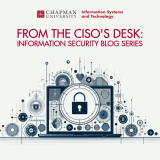
How to Avoid Falling for Scams Online
November 30, 2023
With the end of the year nearing, your friendly Chapman University Information Security department would like to provide you with some tips on how to spot and avoid some common online scams:
Don’t Fall Victim to Fraudulent Job Offers!
Job/check deposit scams lure unsuspecting individuals with promises of easy money or work-from-home opportunities. Here’s how the scam typically works:
- The Approach: Scammers reach out through e-mails, online ads, or social media, posing as legitimate employers or recruitment agencies.
- The Job Offer: They offer you a seemingly attractive job opportunity with minimal effort or high pay. Common roles include secret shoppers, payment processors, or virtual assistants.
- Fake Checks: You receive a check from the scammer, often with a request to deposit it into your bank account. They may ask you to keep a portion as your payment and send the rest back to them or a third party.
- Account Access: Once you deposit the check, the funds appear in your account, giving you a false sense of security. However, the check is counterfeit, and the funds will be reversed or withdrawn later.
- Money Loss: If you send money to the scammer before the check clears, you’ll end up owing your bank the full amount. In some cases, scammers may even gain access to your bank account, leading to further financial losses.
Phishing – Stay Alert and Guard Your Personal Information!
Phishing is a fraudulent practice that targets individuals through deceptive e-mails, messages, or websites. Here’s how to spot and avoid phishing attempts:
- Suspicious Communication: Be wary of unsolicited e-mails, texts, or calls requesting personal or financial information. Scammers often impersonate reputable organizations, such as banks or government agencies.
- Urgency and Fear Tactics: Phishing messages often create a sense of urgency, urging you to take immediate action or risk dire consequences. They may threaten to close your account or claim you’ve won a prize.
- Suspicious Links and Attachments: Avoid clicking on suspicious links or downloading attachments from unknown sources. These can contain malware designed to steal your personal data.
- Verify Sources: Before providing any sensitive information, independently verify the legitimacy of the request by contacting the organization directly through official contact channels.
- Be Vigilant: Regularly monitor your financial accounts, check for unusual activity, and report any suspicious messages or attempts to the appropriate authorities.
Recent Job Scam Phishing E-mail Example
If you receive a job scam/phishing e-mail, Chapman University Information Security recommends reporting the e-mail to abuse@chapman.edu. To learn more about trending scams, please visit www.chapman.edu/scams.
Thank you,
Chapman University Information Systems and Technology (IS&T)


